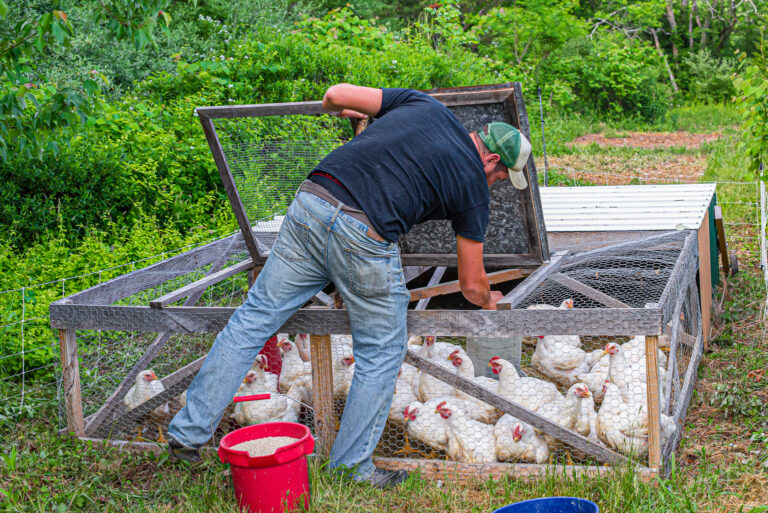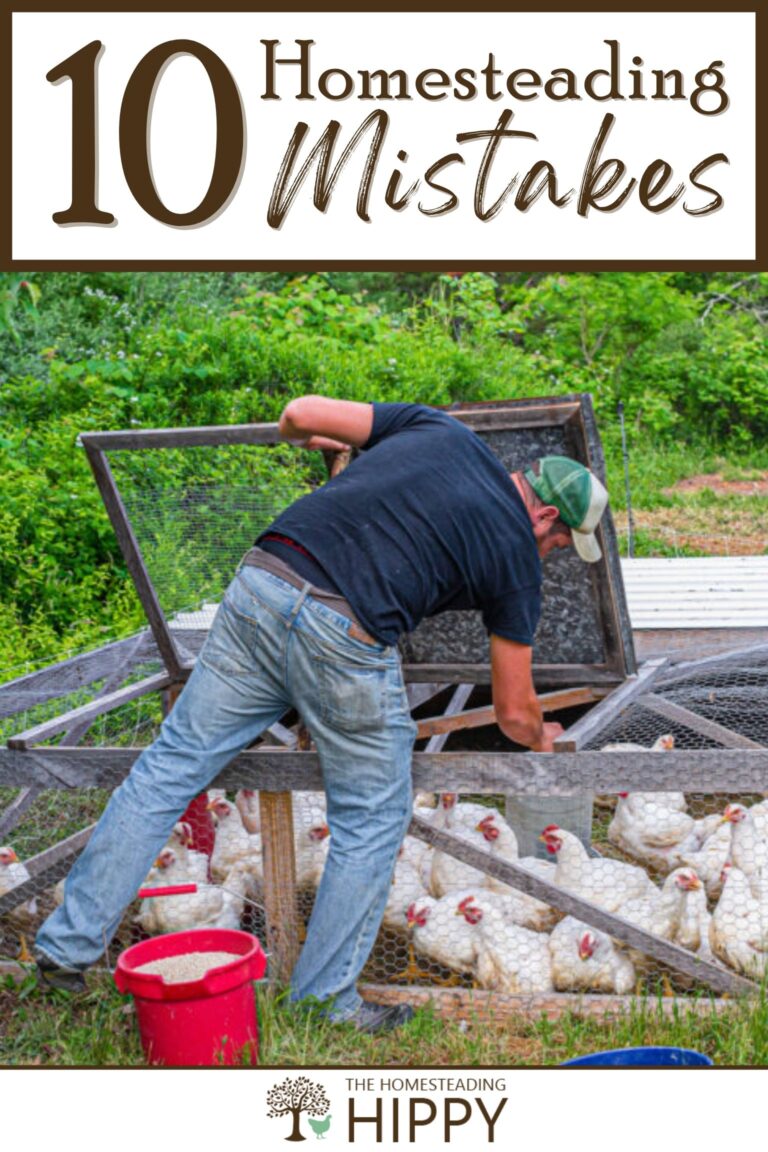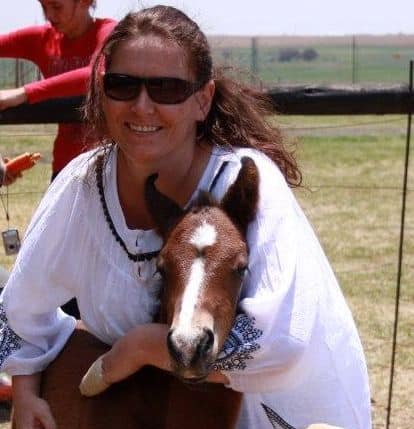We all have lived, and we all have learned. Some of our experiences were good; some not so much.
I was raised 40% urban homesteader and 60% rural homesteader. The truth of what goes into successful homesteading can only be understood when you buy your first homestead and have to figure it all out for yourself.

Being the child of a homestead family and flying solo are very different concepts.
Starting out, I made some big mistakes. Here are the biggest mistakes I have made, what I should have done, and how to fix things after the they’ve been made.
Table of Contents
It All Starts With a Good Plan…
When I first struck out on my own, I underestimated just how much effort, money, time, energy, and documentation to record successes and failures, and a million other things went into homesteading.
It’s important to be realistic when setting out to homestead. Figure out what kind of lifestyle you dream of having, and throw that dream out the window.
Homesteading is a lot more challenging than just tossing some seeds in the ground and keeping a few free-range laying hens.
Buying animals that cannot survive in your area will only lead to frustration and tragedy. Choose breeds that will survive.
Always select the correct seeds to plant in your area. Some veggies do well in some areas and completely fail in others. Always plant veggies that thrive in your climate and do not skimp on the quality of the seeds you buy.
I eventually went with veggies we all ate, but some didn’t flourish in the area. That was really frustrating…
Invest in the infrastructure with well-planned structures made of quality materials that will last for at least five years.
Hold no illusions, homesteading can be challenging. However, what you put in will come back to you 10-fold. Be prepared and then pull your sleeves up and get into a schedule to do the work.
What I Did Wrong
Mistake #1: I went too big too soon.
I think this one is a mistake most homesteaders make.
There is a saying “aim small, hit small.” But there is also a saying “dream big, go big.” Neither saying is correct 100% of the time…
Big dreams are almost always expensive, and they can be more expensive if they go wrong.
It’s better to start with a smaller herd or flock. You can always add to the herd or flock once you have some experience.
If you want goats, start with two and let them roam with your other livestock (sheep, cows, even chickens would be appropriate).
If you want to start with dairy cows, think carefully about how many to get. A cow needs 2 to 5 acres to graze and move around.
Getting too many can quickly destroy nutrients from the soil by overgrazing in a small field or pasture.
If you want to raise chickens or ducks, for chickens, start with 3 to 6, for ducks, start with 5 to 6.
If you want to grow vegetables, research the best seeds and brands for your area and plant smaller beds at first so that you can figure out what will and will not grow in your area.
Also, only grow veggies your family will eat. Growing veggies they will not eat will just result in waste, energy spent unnecessarily, and soil depletion.
Create a map of your property for where you want to plant vegetables, house goats, accommodate chickens and everything else you want to do.
On your map, make a generous surrounding area for where you want to start with each thing.
I say this because if you provide a larger area, you will not have to move everything when you get more livestock or you decide you are ready to extend your vegetable garden.
Mistake #2: I didn’t learn from my own mistakes or from other homesteader’s mistakes. I just kept banging my head until surrender was inevitable.
I convinced myself that a failure was the result of cold weather, hot weather, bugs, or predators.
Yes, these can all contribute to failures. However, you should never do the same thing that fails without doing your homework.
There is always a lesson to be learned. I did not immediately learn from my own mistakes; instead, I made the same mistakes over and over again with the same results. Eventually, I realized, oh… the problem was me!
If you try something and it doesn’t do well, take a moment, do some research, and then try again using a new approach.
Mistake #3: I spent too much on unnecessary tools.
When I struck out on my own, I went all in to get everything my father owned and more.
I spent hundreds of dollars on all kinds of trowels, spades, tillers, aerators, plows, and tools for grooming and caring for livestock.
Some of the money was well spent, but should have been acquired over time. I should have started with the basics and made the best with what I had.
That way, I would have had a better understanding of what I would need to complete a task, and I would have had more money to spend on actual necessities.
Having all the best tools does not negate the need for time and effort.
Mistake #4: I didn’t do enough research on what livestock and breeds flourish in my area.
I chose several of the wrong breeds for our area. We had to build a mini barn to house them in winter because they weren’t well-suited to winter. Heat stroke was also a problem for some breeds.
Always do your homework. It’s so tempting when we see how cute a particular goat or chicken breed is to immediately pick that breed and go all in on that breed.
However, some animals are not built for extreme heat, and some are not built for extreme cold.
For my first homestead, I lived in a very hot climate. I soon learned that the breed of an animal is important and should be part of your plan.
Some breeds are hardier than others. Animals well-suited to hot climates may have thinner coats, shorter hair, they may be lighter in color, and their size and physical characteristics can increase the possibility of survival.
Animals that are better suited to cold climates may have larger bodies, longer legs, be fatter, or have thicker coats to keep them warm.
Ensuring you use good quality breeding animals to increase herds or produce foods can save a lot of time and money.
A chicken that does not lay eggs, when you are raising chickens for eggs, is not earning its keep. It may be more beneficial at the Sunday lunch table.
Research can stop you from making emotional choices on buying or selling animals based on looks or temperament.
Mistake #5: I didn’t research what veggies grow in my area and properly plan growing them.
I planted too many different vegetables that no one but me eats instead of focusing on the ones my whole family eats.
A homestead is for the benefit of your whole family. I do still grow some vegetables that only I enjoy, like broccoli and cauliflower, but the bulk of my garden is dedicated to crops my whole family enjoys, like carrots, tomatoes, pumpkin, gem squash, butternut, peas, and beans.
Veggies that others do not enjoy are easy to slip into stews and curries that the family will eat.
I now grow veggies that can be frozen or canned for the winter months.
I know that good quality seeds can be costly, but they’ll still be cheaper than buying your vegetables, and they will produce better quality and quantity veggies.
Learning about regional vegetables can save you a lot of frustration. It does not help if you plant vegetables that do not grow in your climate.
The position of your veggie garden is also important…
You need full sun to grow vegetables and you need to plant in an area that is inaccessible to herbivores and animals that can trample the plants. You also need access to water for irrigation.
Horses and goats are the biggest culprits in destroying vegetable gardens. Don’t plant near goat pens, or fence in the vegetable garden to keep larger livestock out.
Chickens and ducks can also destroy veggie gardens. Limit access as much as possible.
Mistake #6: I did not give my livestock appropriate protection.
Proper fencing and cover are an essential part of homesteading livestock. I lost a fair share of chickens and ducks to illnesses and predators, and many goats, sheep, and cows to the two-legged predators of the homo thiefess species.
The best place for your animals at night is a lockable building such as a barn, shed, coop, or run that can be locked up and that will not allow access by predators or humans.
Loss of livestock is a serious drain on the finances. Granted, secure accommodations can be costly to install, but in the long term, it will be money well spent.
Mistake #7: I did not plan for extreme weather.
Being unprepared for extreme heat or extreme cold can – and did – also result in the loss of livestock.
Make sure you have plenty of water bowls available with cold water in summer, and indoor heating in the extreme cold of winter.
Be prepared for all weather by providing adequate shelter from rain, snow, strong winds, and heat.
Many animals will appreciate a shallow pool to cool off in in the heat.
Mistake #8: I became too frustrated and impatient and gave up on some projects too soon.
I am a perfectionist, so I’m predisposed to getting frustrated easily. When I get frustrated, I tend to shut down and give up on the source of frustration.
Time and experience, together with a lot of research and planning, can overcome the most trying challenges.
Be patient with yourself and keep trying.
Mistake #9: I tried to do everything on my own – at first, anyway.
Delegating age-appropriate chores to your children can help alleviate the stress on yourself and it can help your children to take responsibility for animals and property, and to learn accountability.
It can be very beneficial to children to teach them from an early age to be self-sufficient and it can give them a great sense of pride and confidence when they achieve a goal and when they graduate to a more important or more challenging task.
Homesteading is a family venture. Make sure you include the whole family by delegating tasks like feeding animals, collecting eggs, mucking out stalls, weeding gardens, planting and harvesting vegetables, bathing animals, and even milking cows or goats in accordance with what is achievable for each child.
Don’t just decide what you think is age-appropriate. If there is one thing I learned about children – specifically from my disabled child – it is that not all children mature emotionally and physically at the same speed.
Some children will never be able to do difficult tasks and others will happily slaughter chickens. Go about delegating chores on an individual basis.
Mistake #10: Location, location, location.
Planning ahead, I thought I just needed to choose the animal and then just go get them. Boy oh boy, was I wrong!
90% of planning involves preparing adequate housing and making sure your animals have a good place to stay before fetching them.
If they don’t have secure accommodation they could wander off, get into your veggies, or get eaten by predators.
Fence in the area they will be kept in, or clear an area in the barn where they can immediately be placed in. Make sure you provide significant shelter with adequate bowls or troughs for food and water.
The shelter needs to be big enough for all them, and at least provide shade from the sun and shelter from the rain. It also needs to be well-ventilated.
Remember, your animals need housing through all the seasons. House them where they can have shade in summer, and protection against snow or cold weather.
I also started off by putting my chicken’s way back on the border of my property. I did this because I knew how smelly a chicken run can be and didn’t want to live with the smell or deal with the inevitable hordes of flies.
Well, that was dumb for several reasons:
- I couldn’t see the chickens from the house.
- It was so easy for people to access, and I lost a lot of chickens from theft.
- My chickens were permanently suffering from bugs and disease. These were carried into the run by the many freeloaders that thought the chickens were being raised for them to steal.
- I walked my legs off walking to and from the chicken run 3 times a day.
- I also lost eggs to thieves.
- With the run so far from the house, it was so easy for predators to break in and kill the chickens.
- If there was a ruckus, I could not hear it from the house.
A well-thought-out floor plan of your homestead will provide convenient access to all areas, and it will provide room to grow the types of livestock and herd size, and the size of your vegetable garden.
Tips for Success
1. Don’t waste food by not canning or preserving enough for winter.
2. Make sure you label preserved food with what is stored in the jar as well as the date it was canned.
That way you will not have mystery jars and you can use the oldest products first keeping newer jars freshest.
3. Make sure that if you’re going away for any length of time that you appoint adequately skilled sitters to care for your animals and property.
4. Not keeping adequate records can lead to confusion and genetic issues. If you breed animals, you do not want any in-breeding.
It’s important that you know which animal is the father and which is the mother of each offspring.
In your vegetable garden, recording crops that did well at specific times of year and the brand of seeds used can lead to the efficient use of beds.
5. Prioritize finances so that the most important items on your homestead are taken care of first. Choosing between animal health and growing a new bed of vegetables can be a very important decision.
6. If you expect the unexpected, you will limit stress when unforeseen issues arise.
7. Learn to accept what cannot be immediately changed or done. Give yourself some slack. Not every task is critical and not every decision will work out. Don’t let circumstances get you down.
Conclusion
Human beings aren’t perfect; we won’t make the right choices every time. We will try and we will fail at certain things. What is important is how we manage our success and failure.
When things don’t go according to plan, we can do one of two things. We can accept that this is not a task for us, or we can do the homework and try using a different strategy.
The prayer that is so applicable for homesteading would be the prayer attributed to Reinhold Niebuhr:
God grant me the serenity to accept the things I cannot change, the courage to change the things I can, and the wisdom to know the difference.
Take this to heart and you will learn from your own – and my – mistakes, and you will have more successes than failures in your ventures.


Di-Anne Devenish Seebregts was raised in an environment where daily life consisted of hiking, environmental conservation, growing fruit and vegetables, and raising poultry for meat and eggs.
She combined her passion for the writing word with her love of the pride that comes with not relying on others. She raised three children (who are now adults) to value the environment, and understand the value of being self-sufficient.
Find out more about Di-Anne on our About Us page.
